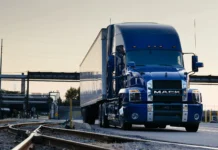SPONSORED CONTENT

Advanced safety features in trucks are transforming the transportation industry, offering solutions that significantly reduce accident liability. By integrating technologies such as collision avoidance systems and lane departure warnings, trucks are increasingly able to prevent accidents before they happen. These features not only enhance safety for drivers and their cargo but also benefit other road users.
Accident liability often arises from human error, an issue that advanced safety systems help mitigate. Features like automatic emergency braking and blind-spot detection provide an extra layer of protection, making roads safer for everyone. These technologies lead to fewer accidents, which reduces the legal and financial implications for trucking companies.
Investing in state-of-the-art safety features can also improve a company’s market reputation. By demonstrating a commitment to safety, trucking firms can attract more business, as clients prefer partners who focus on minimizing risks. Enhanced safety measures translate into cost savings and operational efficiency, which are crucial in today’s competitive market.
Understanding Truck Safety Technologies
Modern trucks are equipped with advanced technologies designed to prevent collisions, maintain vehicle stability, and assist drivers in navigating challenging road conditions. Among them are the following:
Collision Mitigation Systems
Collision Mitigation Systems (CMS) help prevent accidents by acting as a proactive measure in critical situations. These systems use sensors and radar to monitor the road and surrounding vehicles. If a potential collision is detected, CMS can alert the driver or automatically apply brakes to reduce speed.
Stability Control Enhancements
Stability Control Enhancements are vital to maintaining control of large vehicles, especially in adverse weather conditions. These systems, such as Electronic Stability Control (ESC), work by continuously monitoring the truck’s movement. They can adjust braking power to individual wheels to prevent skidding or rollovers.
Stability control is particularly important on steep inclines, sharp curves, and uneven surfaces where trucks are at risk of tipping. By ensuring that the vehicle remains stable, these systems protect not only the cargo but also other road users. Implementing these technologies is a significant step in reducing risks and protecting your rights after a trucking accident.
Advanced Driver Assistance Systems
Advanced Driver Assistance Systems (ADAS) provide a wide range of features aimed at improving driver safety and comfort. These include lane departure warnings, adaptive cruise control, and blind-spot detection. By offering real-time feedback and assistance, ADAS play a pivotal role in helping drivers make informed decisions.
ADAS fosters a safer driving environment by reducing human error—a significant factor in many trucking accidents. These systems can dramatically decrease the likelihood of accidents, promoting safer roads and fewer liabilities, benefiting fleet owners and drivers alike.
Legal Implications of Safety Features
Advanced safety features in trucks significantly influence legal matters by reducing accident liability and affecting truck accident litigation.
Reduction in Accident Liability
Modern safety technology in trucks, such as automatic emergency braking and lane-keeping systems, helps in reducing accident liability. By minimizing collisions, these features decrease the likelihood of legal claims against trucking companies.
Insurance providers may offer lower premiums for trucks equipped with advanced safety technology. This reduction in cost reflects the decreased risk associated with vehicles that are less likely to be involved in accidents.
Trucking companies in cities from Atlanta to Seattle and everywhere in between could benefit significantly from investing in such technologies. Legal defenses become stronger as the implementation of these systems demonstrates a commitment to safety.
Impact on Truck Accident Litigation
Trucks equipped with technology that records driving behavior provides companies with access to valuable data during legal proceedings. This information can support defenses or clarify accident circumstances.
In cases where advanced safety systems are proven effective, litigation might conclude more rapidly, reducing legal costs. For instance, an Truck Accident Lawyer in Atlanta or anywhere else might see fewer prolonged cases due to clearer evidence of liability, or lack thereof.
Trucking firms that prioritize safety can also experience favorable judgments. This is because their proactive measures reflect a responsible approach, potentially reducing punitive damages in court cases. Overall, advanced safety measures shift the legal landscape toward accountability and thorough documentation.
















![Which is More Reliable: 3.5L EcoBoost or 5.0L V8? [Reader Question] Second-generation 3.5-liter EcoBoost engine](https://tfltruck.com/wp-content/uploads/2016/05/Second-generation-35-liter-EcoBoost-engine.jpg)
![Which Silverado Engine to Get: 5.3L or 6.2L V8? [Ask TFLTruck] 2016 chevy silverado](https://tfltruck.com/wp-content/uploads/2015/10/2016-chevy-silverado-grille.jpg)
